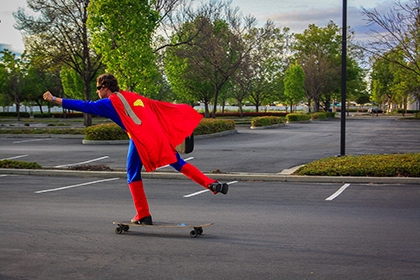On January 14, 2014, The Academy of Motion Picture Arts and Sciences announced the 2014 Oscars telecast would celebrate “cinematic heroes.” My cynical self said, “This is just a ploy to sneak in Iron Man.” But the closer we got to the event, the more excited I was to see produced vignettes showcasing the telecast’s theme.
Note To Self: The Oscars fluff is not as good as Olympics fluff. Sorry guys.
There were a few major montages but the two that really stuck out in my mind were the “Ordinary Man” and “Superheroes” montages. Both celebrated heroes as portrayed in cinema. The first featured a measly six female heroines (think Jessica Chastain from Zero Dark Thirty and Oprah in The Butler). The second surprisingly was a bit better, featuring nine or ten heroines. (depending how you count Pepper Potts from the first Iron Man. More on that later).
When that second montage ended, I found myself screaming at the TV: Where’s Hermione? And no, the cut to Emma Watson applauding politely doesn’t count.
Harry was featured no less than three times in the montage but Hermione couldn’t even get a moment to sock Malfoy in the nose. This whole bit of outrage led to a discussion among friends: Why weren’t there more female characters featured in these montages? We had Neo, but why didn’t we have Trinity? We had Lincoln, but not Margaret Thatcher? At my Oscar viewing party, we debated whether or not we should count Pepper Potts in the superheroes montage as one for the lady team. Arguably, since it’s from the first movie, she’s kind of a victim. But I do think we have to give her credit for grounding Tony and being his “ordinary hero.”
The Oscars were months ago and I’m still plagued by this question: What makes someone a hero?
I think often we confuse heroes with icons, and I am not sure they are always the same. According to the Oxford English Dictionary, a hero is “A person, typically a man, who is admired or idealized for courage, outstanding achievements, or noble qualities.”
It’s interesting because if I asked you to name some super heroes in movies, you might say The Hulk, Iron Man, Captain America, Batman, Jean Grey or Storm. But if you look at the definition above, only two of these heroes fit that definition. The X-men live largely in secret, so how can they be recognized or admired for their courage? The Hulk is still considered a danger to most of society (smashing things isn’t a good thing all the time). Batman is a vigilante no matter how you slice it.
Are these people still heroes? Can you be a hero without public recognition? What about the reluctant hero? Is someone who doesn’t want to play this role, still a hero? Katniss doesn’t become a “hero” until Catching Fire because for a long time she rejects the burden associated with being the defiant victor.
Outside the sci-fi/fantasy hero realm, we can look at Jessica Chastain’s character Maya from Zero Dark Thirty. No one really knows who this person was. For her safety, privacy, etc. the filmmakers assert she is a compilation of people. Since she is not publicly admired for her actions to stop Osama Bin Laden, is she less of a hero than those on Seal Team Six?
This brings me into the subject of sidekicks. I am a giant Harry Potter fan, although sometimes I don’t agree the with the Internet’s feelings on the fandom. But I was equally outraged as the whole Internet was when Hermione was left out of that Oscars montage. I personally felt there was a distinct lack of sidekicks in both these montages. And it’s not fair. In the “Ordinary Man montage,” where was Geoffery Rush’s character in The King’s Speech, alongside Colin Firth’s? Without the support of sidekicks, heroes often wouldn’t be able to achieve their ultimate goal. Where would Harry be without Ron, Hermione, Neville, or Mrs. Weasley, or… heck, I could go on all day. If you ask me, I think the sidekicks deserved their very own montage! Just because they aren’t the lead character doesn’t mean we shouldn’t celebrate sidekicks as heroes.
In the end, I’m upset about the cinematic heroes montage. Being a hero isn’t just about puffing out your chest or standing up in front of a crowd. Yes, you have to own your position. After all—great power, great responsibility… all of those things. But I think there is something powerful about the simplicity of doing the right thing without being asked. I wish there were more time to celebrate the heroes who just keep their heads down and do what needs to be done, regardless of the attention it may or may not bring them.
I recently watched the documentary Miss Representation, and at one point they are talking to this high school student (now Stanford senior), Devanshi Patel, about what leadership means to her as she runs for Youth Governor of California. She says to her mother in the documentary, “Leaders are just servants to the people.” I think this is how we ought to view our heroes: as people who serve others, regardless of whatever fame and admiration they may attract.
What do you think?

Photo by Gali Levi-McClure